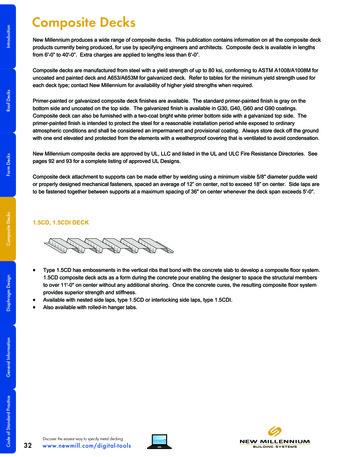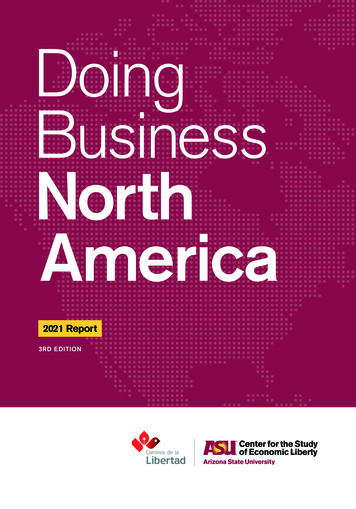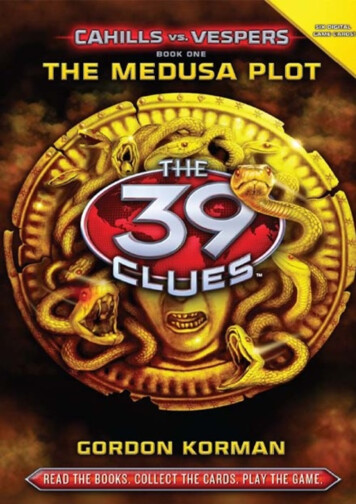
Transcription
Chapter 400 )404.07(h)Introduction to Disclosures and DiscoveryDiscovery ConferencesInitial DisclosuresExpert DisclosuresModification of Disclosure ObligationsForm of DisclosuresOther Requirements Under the Board’s Disclosure RegimeScope of DiscoveryIn GeneralLimitations on Right to Discovery and on Electronically Stored InformationTiming of DiscoveryIn GeneralTime for Service of Discovery Requests and Taking of DepositionsTime for Service of Discovery ResponsesExtensions of Discovery Period, Time to Respond to Discovery Requests andDisclosuresNeed for Early Initiation of DiscoveryTo Allow Time for “Follow-up” DiscoveryTo Facilitate Introduction of Produced DocumentsDiscovery DepositionsWhen Permitted and By WhomWho May be DeposedPlace of Deposition; Oral or Written Deposition; Securing Attendance of DeponentPerson Residing in the United States – In GeneralPerson Residing in the United States – PartyPerson Residing in the United States – Non-partyPerson Residing in a Foreign Country – PartyPerson Residing in a Foreign Country – Non-partyWilling Non-partyUnwilling Non-party – The Hague Convention and Letter RogatoryProcedureForeign Person Present Within the United States – PartyForeign Person Present Within the United States – Non-partyPersons before Whom Depositions May be TakenNotice of DepositionTaking a Discovery DepositionFed. R. Civ. P. 30(b)(1) Depositions by Oral Examination of a Natural PersonFed. R. Civ. P. 30(b)(6) Deposition of a Corporation, Organization, Partnership,Association, or Other Juristic PersonTime for DepositionRe-Deposing a WitnessDiscovery Depositions on Written QuestionsDepositions on Written Questions: Before Whom TakenDepositions on Written Questions: When TakenDepositions on Written Questions: Place of DepositionDepositions on Written Questions: Notice of DepositionDepositions on Written Questions: Examination of WitnessDepositions on Written Questions: ObjectionsDepositions on Written Questions: Form of Deposition; SignatureDepositions on Written Questions: Certification of Deposition400-1June 2017
TRADEMARK TRIAL AND APPEAL BOARD MANUAL OF 7.05(c)407.05(d)407.05(e)408June 2017Depositions on Written Questions: Service, Correction, and Making theDeposition of RecordDeposition on Written Questions: UtilityDiscovery Deposition ObjectionsObjections to NoticeObjections as to Disqualification of OfficerObjections During DepositionDiscovery Depositions Compared to Testimony DepositionsInterrogatoriesWhen Permitted and By WhomScopeLimit on NumberDescription of LimitApplication of Limit: Sets of InterrogatoriesApplication of Limit: Multiple Marks, Etc.Application of Limit: Counting InterrogatoriesRemedy for Excessive InterrogatoriesResponses to InterrogatoriesTime for Service of ResponsesNature of ResponsesSignature of Responses and Authority of SignerRequests for Production of Documents and Things and Electronically StoredInformationWhen Permitted and By WhomScopeElements of Request for ProductionResponses to Requests for ProductionTime for Service of ResponsesPlace and Form of ProductionNature of ResponsesLimit on NumberDescription of LimitApplication of Limit: Sets of Requests for ProductionApplication of Limit: Multiple Marks, Etc.Application of Limit: Counting Requests for ProductionRemedy for Excessive Requests for ProductionRequests for AdmissionsWhen Permitted and By WhomScope and Nature of Requests for AdmissionResponses to Requests for AdmissionTime for Service of ResponsesNature of ResponsesSignature of ResponsesEffect of AdmissionLimit on NumberDescription of LimitApplication of Limit: Sets of Requests for AdmissionApplication of Limit: Multiple Marks, Etc.Application of Limit: Counting Requests for AdmissionRemedy for Excessive Requests for AdmissionDuties to Cooperate, Search Records, Supplement400-2
6(a)412.06(b)413413.01413.02414§ 401Duty to CooperateObligation to Conduct Discovery ConferenceObligation to Make Initial and Expert Testimony DisclosuresDuty to Cooperate With Regard to Written Discovery and DisclosuresDuty to Search RecordsDuty to Supplement Disclosures and Discovery ResponsesFiling Discovery Requests, Discovery Responses, and Disclosures With BoardAsserting Objections to Requests for Discovery, Motions Attacking Requests forDiscovery, and DisclosuresRemedy for Failure to Provide Disclosures or DiscoveryInitial and Expert Testimony DisclosuresInterrogatories or Requests for ProductionRequests for AdmissionDiscovery DepositionsSanctions Related to Disclosures and DiscoveryProtective OrdersIn General – Board Standard Protective OrderProper Designation of Confidential MatterChallenging the Designation of Confidential MatterOver-designation: Improper designation of confidential filings with the BoardModification of Board’s Standard Protective Order Governing the Exchange ofConfidential, Highly Confidential and Trade Secret/Commercially SensitiveInformationModification of Board’s Standard Protective Order upon StipulationPro Se Litigants and In-House Legal CounselIn Camera InspectionContents of Protective OrderDuration of Protective OrderFiling Confidential Materials with BoardHandling of Confidential Materials by the BoardProtective Orders Limiting DiscoveryDepositionsOther DiscoveryTelephone and Pretrial ConferencesTelephone Conferences for Motions Relating to DiscoveryPretrial ConferencesSelected Discovery Guidelines401 Introduction to Disclosures and Discovery37 CFR § 2.120(a)(1) [Discovery.] In general. Except as otherwise provided in this section, and whereverappropriate, the provisions of the Federal Rules of Civil Procedure relating to disclosure and discoveryshall apply in opposition, cancellation, interference and concurrent use registration proceedings. Theprovisions of Rule 26 of the Federal Rules of Civil Procedure relating to required disclosures, the conferenceof the parties to discuss settlement and to develop a disclosure and discovery plan, the scope, proportionality,timing and sequence of discovery, protective orders, signing of disclosures and discovery responses, andsupplementation of disclosures and discovery responses, are applicable to Board proceedings in modifiedform, as noted in these rules and as may be detailed in any order instituting an inter partes proceeding orsubsequent scheduling order. The Board will specify the deadline for a discovery conference, the openingand closing dates for the taking of discovery, and the deadlines within the discovery period for making initial400-3June 2017
§ 401TRADEMARK TRIAL AND APPEAL BOARD MANUAL OF PROCEDUREdisclosures and expert disclosure. The trial order setting these deadlines and dates will be included withinthe notice of institution of the proceeding.Through the use of the various disclosures (i.e., initial and expert) and discovery devices (i.e., discoverydepositions, interrogatories, requests for production of documents and things, and requests for admission)available to litigants in inter partes proceedings before the Board, a party may ascertain the facts underlyingits adversary’s case. Discovery of these facts may lead to a settlement of the case, may simplify the issues,or may reveal a basis for a motion for summary judgment, an additional claim (in the case of a plaintiff), oran additional defense or counterclaim (in the case of a defendant). At the very least, taking discovery enablesthe propounding party to propose to the responding party stipulations of fact, stipulations as to proceduresfor introducing into the record evidence produced in response to discovery requests, and to otherwise preparefor trial. Propounding and responding to discovery may further lead parties to stipulate to narrowing theissues for trial, or to stipulate to expedited determination of their case under the Board’s Accelerated CaseResolution (ACR) process. [Note 1.] See TBMP § 528.05(a)(2), TBMP § 702.04 and TBMP § 705 forinformation regarding ACR and stipulations.The conduct of discovery in Board inter partes proceedings is governed by 37 CFR § 2.120. Discoverybefore the Board under 37 CFR § 2.120 is similar in many respects to discovery before the federal districtcourts under the Federal Rules of Civil Procedure. Ordinarily, the discovery provisions of the Federal Rulesof Civil Procedure are applicable in Board inter partes proceedings, except as otherwise provided in 37 CFR§ 2.120. The provisions of the Federal Rules of Civil Procedure relating to automatic disclosure and discoveryconferences are applicable to inter parties proceedings. However, the Board has adopted a modified disclosureand conferencing regime. [Note 2.] All parties to Board proceedings are obliged to (1) conduct a discoveryconference to discuss, inter alia, disclosure and discovery plans, and (2) make initial, expert, and pretrialdisclosures. The Board adopted the disclosure regime of the Federal Rules of Civil Procedure in order topromote the early exchange of information and earlier settlement of cases and, for cases that do not settle,“more efficient discovery and trial, [reduction of] incidents of unfair surprise, and [to] increase the likelihoodof fair disposition of the parties’ claims and defenses.” [Note 3.] In addition, the utilization of initial andexpert disclosures is intended to “obviate the need to use traditional discovery to obtain ‘basic information’about a party’s claims or defenses.” [Note 4.] In the absence of any express written statement from the partiesfiled with the Board that they waive their reciprocal rights to obtain disclosures or agree to restrictions onthe use of particular discovery devices, the Board will presume the parties will comply with their obligationto make all required disclosures and will utilize traditional discovery devices, as permitted by the TrademarkRules and Federal Rules of Civil Procedure. [Note 5.]For more information regarding discovery conferences, see TBMP § 401.01 and TBMP § 408.01(a).For a discussion of when discovery requests, discovery responses, and disclosures should be filed with theBoard, see TBMP § 409 and 37 CFR § 2.120(k)(8).For information regarding pretrial disclosures, see TBMP § 702.01.For information regarding Accelerated Case Resolution (ACR), see TBMP § 528.05(a)(2), TBMP § 702.04,and TBMP § 705.NOTES:1. For a discussion of the purposes served by discovery, see Fischer Gesellschaft m.b.H. v. Molnar & Co.,203 USPQ 861, 865 (TTAB 1979). See also Bison Corp. v. Perfecta Chemie B.V., 4 USPQ2d 1718, 1720(TTAB 1987); Smith International, Inc. v. Olin Corp., 201 USPQ 250, 250 (TTAB 1978). For a discussionJune 2017400-4
DISCOVERY§ 401.01of ACR, see, for example, Eveready Battery Co., Inc. v. Green Planet, Inc., 91 USPQ2d 1511, 1513 (TTAB2009).2. MISCELLANEOUS CHANGES TO TRADEMARK TRIAL AND APPEAL BOARD RULES, 72 Fed.Reg. 42242, 42244-47 (August 1, 2007); 37 CFR § 2.120(a); Fed. R. Civ. P. 26(a)(1)(A); Fed. R. Civ. P.26(a)(2); Fed. R. Civ. P. 26(a)(3); Fed. R. Civ. P. 26(f).3. MISCELLANEOUS CHANGES TO TRADEMARK TRIAL AND APPEAL BOARD RULES OFPRACTICE, 72 Fed. Reg. 42242, 42244 and 42246 (August 1, 2007). See also Luster Products Inc. v. VanZandt, 104 USPQ2d 1877, 1879-80 n.5 (TTAB 2012) (citing August 1, 2007 final rule); Spier Wines (PTY)Ltd. v. Shepher, 105 USPQ2d 1239, 1246 (TTAB 2012) (disclosures, from initial through pretrial, anddiscovery responses should be viewed as a continuum of communication designed to avoid unfair surpriseand to facilitate a fair adjudication of the case on the merits); General Council of the Assemblies of God v.Heritage Music Foundation, 97 USPQ2d 1890, 1893 (TTAB 2011) (adoption of disclosure model intendedto provide an orderly administration of the proceeding as it moves to trial).4. MISCELLANEOUS CHANGES TO TRADEMARK TRIAL AND APPEAL BOARD RULES OFPRACTICE, 72 Fed. Reg. 42242, 42244 and 42246 (August 1, 2007).5. Boston Red Sox Baseball Club LP v. Chaveriat, 87 USPQ2d 1767, 1767-68 (TTAB 2008).401.01 Discovery Conferences37 CFR § 2.120(a)(1) [Discovery] . . . The provisions of Rule 26 of the Federal Rules of Civil Procedurerelating to . . . the conference of the parties to discuss settlement and to develop a disclosure and discoveryplan . . . are applicable to Board proceedings in modified form . . . . The Board will specify the deadline fora discovery conference . . . . * * * *37 CFR § 2.120(a)(2)(i) The discovery conference shall occur no later than the opening of the discoveryperiod, and the parties must discuss the subjects set forth in Rule 26(f) of the Federal Rule of Civil Procedureand any subjects set forth in the Board’s institution order. A Board Interlocutory Attorney or AdministrativeTrademark Judge will participate in the conference upon request of any party made after answer but nolater than ten days prior to the deadline for the conference, or when the Board deems it useful for the partiesto have Board involvement. The participating attorney or judge may expand or reduce the number or natureof subjects to be discussed in the conference as may be deemed appropriate.****(v) The parties are not required to prepare or transmit to the Board a written report outlining their discoveryconference discussions, unless the parties have agreed to alter disclosure or discovery obligations set forthby these rules or applicable Federal Rules of Civil Procedure, or unless directed to file such a report by aparticipating Board Interlocutory Attorney or Administrative Trademark Judge.Fed. R. Civ. P. 26(f)(2) Conference Content; Parties’ Responsibilities. In conferring, the parties mustconsider the nature and basis of their claims and defenses and the possibilities for promptly settling orresolving the case; . . . discuss any issues about preserving discoverable information, and develop a proposeddiscovery plan.400-5June 2017
§ 401.01TRADEMARK TRIAL AND APPEAL BOARD MANUAL OF PROCEDUREFor all inter partes proceedings, the parties are required to hold a discovery conference to discuss the subjectsset forth in Fed. R. Civ. P. 26(f) and in the institution order for the case. [Note 1.] As specified in the Board’sinstitution order:“The parties are required to schedule and hold a discovery conference by the deadline in the schedule inthis order, or as reset by the Board. In the conference, the parties are required to discuss, at a minimum,1) the nature and basis of their claims and defenses, 2) the possibility of promptly settling, or at leastnarrowing the scope of claims or defenses, and 3) arrangements for disclosures, discovery, preservingdiscoverable information and introduction of evidence at trial. For guidance, see Fed. R. Civ. P. 26(f),Trademark Rule 2.120(a)(2)(i), and TBMP §§ 401.01 and 408.01(a).The conference is not limited to the subjects listed in Fed. R. Civ. P. 26(f) or in the Board’s institution order,and “the parties are free to discuss any additional topics that could promote settlement or efficient adjudicationof the Board proceeding” including alternative means for adjudication such as the Board’s Accelerated CaseResolution (ACR) procedure. [Note 2.] See TBMP § 528.05(a)(2) and TBMP § 702.04 for further informationon ACR. Because the parties may enter into stipulations altering disclosure obligations, they should continueto discuss their reciprocal obligations and progress made in satisfying such obligations even after the discoveryconference has been held.The conference should take place once the pleadings have closed and by the deadline set forth in the Board’sinstitution order (or by any extended deadline approved by the Board), and must take place no later than theopening of the discovery period. [Note 3.] In instances, however, where the defendant is in default, or apleading motion under Fed. R. Civ. P. 12 has been filed, or a counterclaim has been filed, the parties’obligation to have a discovery conference is tolled or effectively stayed. [Note 4.] The rationale is that ananswer must be filed to all claims and counterclaims, and issues related to the pleadings resolved before theparties can have a meaningful discovery conference. [Note 5.] In such cases, the Board will reset the deadlinefor the discovery conference as well as all subsequent dates, upon resolution of the default or Fed. R. Civ.P. 12 motion, or acknowledgement of the counterclaim, which may include setting or resetting the deadlinefor filing an answer. [Note 6.] Generally after an answer is filed, the Board is unlikely to find good causeto extend the deadline for the discovery conference for settlement negotiations, even upon stipulation orconsent. [Note 7.] There is no Fed. R. Civ. P. 16(b) scheduling/conference order.The parties’ discovery conference may be in person or by other means (e.g. telephone). [Note 8.] If anyparty wants a Board professional to participate in the required discovery conference, the party must submitsuch request through ESTTA, the Board’s electronic filing system, or call the Board attorney assigned tothe case no later than ten (10) days prior to the deadline for conducting the discovery conference, so as tofacilitate completion of the conference by the deadline. [Note 9.] Submitting a request using ESTTA ispreferred; however, parties are encouraged to follow up a few days later with a phone call to the Boardattorney assigned to the case if they have not yet been contacted by a Board attorney. Board participationis encouraged where pro se litigants are involved. [Note 10.] The Board, on its own initiative, may elect toparticipate in the discovery conference when the Board deems it useful for the parties to have Boardinvolvement. [Note 11.] The participating attorney or judge has discretion to expand or reduce the numberor nature of subjects to be discussed during the conference. [Note 12.] For instance, the Board professionalmay ascertain whether the parties have previously engaged in settlement discussions, explain to the partiesthe Board’s ACR option, and may inquire whether the parties need additional time after the conference todiscuss settlement. [Note 13.] Participation by a Board professional will be by telephone. [Note 14.] Theconference will not be recorded by the Board and shall not be recorded by the parties. [Note 15.]If a party desires the appearance of more than one counsel on behalf of a party in a discovery conferencewith Board participation, that party is to designate a lead counsel to represent the party in the conference.June 2017400-6
DISCOVERY§ 401.01With respect to pro se parties, the person who appears on behalf of the party, must be authorized under 37CFR § 11.14(e). See TBMP § 114 (Party May Represent Itself). If a pro se litigant desires to have counselappear on its behalf strictly for purposes of the discovery conference with Board participation, such counselshall file a notice of appearance prior to the conduct of the discovery conference for this limited purpose.Subsequently, counsel will file a notice of withdrawal, unless counsel has been retained by the party to takefurther action on behalf of the party in the case. See TBMP § 116.01 regarding termination of representation.In discovery conferences with Board participation, parties must conduct themselves with appropriate decorumand interruptions are to be avoided. [Note 16.] The Board professional participating in the conferencegenerally will signal that a party may make a presentation by inviting the party to do so or by inviting aresponse to a presentation made by another. The Board professional may make other requirements for theorderly conduct of the discovery conference.If neither party requests Board participation in the discovery conference and the Board does not elect toparticipate in the conference on its own initiative, the parties still must conference no later than the prescribeddeadline, and the Board will operate on the assumption that the conference was held by the deadline. Themere discussion of settlement among the parties does not substitute for a full discovery conference of subjectsset forth in Fed. R. Civ. P. 26(f) and the Board’s institution order. [Note 17.]The parties do not have to file a disclosure/discovery plan with the Board following their discovery conference,unless they are seeking leave by motion or stipulation to alter standard deadlines or obligations, or unlessthey were directed to do so by the Board. [Note 18.]The Board has the authority to order parties to hold a discovery conference, either sua sponte or upon motion.[Note 19.]For a discussion regarding the duty to cooperate in scheduling and conducting a discovery conference, andthe imposition of sanctions for the failure to participate in a discovery conference, see TBMP § 408.01(a).For general information on the conduct of telephone conferences, participation in telephone conferences,and issuance of rulings resulting from telephone conferences, see TBMP § 502.06(a).NOTES:1. 37 CFR § 2.120(a)(1); 37 CFR § 2.120(a)(2)(i); Fed. R. Civ. P. 26(f). See, e.g., Promgirl, Inc. v. JPCCo., 94USPQ2d 1759, 1761-62 (TTAB 2009) (mere discussion of settlement does not substitute for fulldiscovery conference of subjects set forth in Fed. R. Civ. P. 26 and Board’s institution order). SeeMISCELLANEOUS CHANGES TO TRADEMARK TRIAL AND APPEAL BOARD RULES OFPRACTICE, 72 Fed. Reg. 42242, 42245 and 42252 (August 1, 2007) for information about the adoption ofa discovery conference in Board proceedings.2. MISCELLANEOUS CHANGES TO TRADEMARK TRIAL AND APPEAL BOARD RULES OFPRACTICE, 72 Fed. Reg. 42242, 42245 and 42252 (August 1, 2007). See Weatherford/Lamb Inc. v. C&JEnergy Servs., Inc., 96 USPQ2d 1834, 1836 n.4 (TTAB 2010) (parties encouraged to discuss ACR duringdiscovery conference). See also MISCELLANEOUS CHANGES TO TRADEMARK TRIAL AND APPEALBOARD RULES OF PRACTICE, 81 Fed. Reg. 69950, 69959, 69961 (October 7, 2016) (if voluminousproductions anticipated, method of service is worthwhile issue to discuss at Board discovery conference;production of ESI is a subject for discussion at discovery).400-7June 2017
§ 401.01TRADEMARK TRIAL AND APPEAL BOARD MANUAL OF PROCEDURE3. 37 CFR § 2.120(a)(2)(i). See also MISCELLANEOUS CHANGES TO TRADEMARK TRIAL ANDAPPEAL BOARD RULES OF PRACTICE, 72 Fed. Reg. 42242, 42245 (August 1, 2007).4. 37 CFR § 2.106(a), 37 CFR § 2.114(a) and 37 CFR § 2.127(d). MISCELLANEOUS CHANGES TOTRADEMARK TRIAL AND APPEAL BOARD RULES OF PRACTICE, 81 Fed. Reg. 69950, 69957,69959, 69967 (October 7, 2016). See also MISCELLANEOUS CHANGES TO TRADEMARK TRIALAND APPEAL BOARD RULES OF PRACTICE, 72 Fed. Reg. 42242, 42245 (August 1, 2007) (filing ofa counterclaim results in proceeding effectively being stayed).5. MISCELLANEOUS CHANGES TO TRADEMARK TRIAL AND APPEAL BOARD RULES OFPRACTICE, 72 Fed. Reg. 42242, 42245 (August 1, 2007).6. MISCELLANEOUS CHANGES TO TRADEMARK TRIAL AND APPEAL BOARD RULES OFPRACTICE, 72 Fed. Reg. 42242, 42245 (August 1, 2007).7. MISCELLANEOUS CHANGES TO TRADEMARK TRIAL AND APPEAL BOARD RULES OFPRACTICE, 72 Fed. Reg. 42242, 42245 (August 1, 2007). See Boston Red Sox Baseball Club LP v.Chaveriat, 87 USPQ2d 1767, 1767 n.1 (TTAB 2008) (“The Board is unlikely to find good cause when sucha request is based on the parties’ desire to engage in settlement discussions.”).8. MISCELLANEOUS CHANGES TO TRADEMARK TRIAL AND APPEAL BOARD RULES OFPRACTICE, 72 Fed. Reg. 42242, 42245 (August 1, 2007).9. See 37 CFR § 2.120(a)(2)(i); MISCELLANEOUS CHANGES TO TRADEMARK TRIAL AND APPEALBOARD RULES OF PRACTICE, 72 Fed. Reg. 42242, 42245 (August 1, 2007). But see Promgirl, Inc. v.JPC Co., 94 USPQ2d 1759, 1762 (TTAB 2009) (Board professional can participate in discovery conferencewith less than ten days’ notice in instances where parties are at an impasse; conference may take place afterdeadline in those circumstances).10. MISCELLANEOUS CHANGES TO TRADEMARK TRIAL AND APPEAL BOARD RULES OFPRACTICE, 72 Fed. Reg. 42242, 42252 (August 1, 2007) (“. Board professionals involved in conferenceswill fill the educator’s role [that] would have to be filled by experienced counsel.”).11. 37 CFR § 2.120(a)(2)(i). MISCELLANEOUS CHANGES TO TRADEMARK TRIAL AND APPEALBOARD RULES OF PRACTICE, 81 Fed. Reg. 69950, 69960 (October 7, 2016).12. 37 CFR § 2.120(a)(2)(i).13. MISCELLANEOUS CHANGES TO TRADEMARK TRIAL AND APPEAL BOARD RULES OFPRACTICE, 72 Fed. Reg. 42242, 42252 (August 1, 2007).14. MISCELLANEOUS CHANGES TO TRADEMARK TRIAL AND APPEAL BOARD RULES OFPRACTICE, 72 Fed. Reg. 42242, 42245 (August 1, 2007).15. 37 CFR § 2.120(j)(3).16. 37 CFR § 2.192; 37 CFR § 11.305(d).17. Promgirl, Inc. v. JPC Co., 94 USPQ2d 1759, 1761-62 (TTAB 2009).June 2017400-8
DISCOVERY§ 401.0218. 37 CFR § 2.120(a)(2)(v); MISCELLANEOUS CHANGES TO TRADEMARK TRIAL AND APPEALBOARD RULES OF PRACTICE, 72 Fed. Reg. 42242, 42245 (August 1, 2007).19. See, e.g., Promgirl, Inc. v. JPC Co., 94 USPQ2d 1759, 1763 (TTAB 2009).401.02 Initial Disclosures37 CFR § 2.120(a)(2)(ii) Initial disclosures must be made no later than thirty days after the opening of thediscovery period.37 CFR § 2.120(a)(3) A party must make its initial disclosures prior to seeking discovery, absent modificationof this requirement by a stipulation of the parties approved by the Board, or a motion granted by the Board,or by order of the Board. * * * *Fed. R. Civ. P. 26(a)(1) Initial Disclosure.(A) In General. Except as exempted by Rule 26(a)(1)(B) or as otherwise stipulated or ordered by thecourt, a party must, without awaiting a discovery request, provide to the other parties:(i) the name and, if known, the address and telephone number of each individual likely to havediscoverable information — along with the subjects of that information — that the disclosing party may useto support its claims or defenses, unless the use would be solely for impeachment;(ii) a copy — or a description by category and location — of all documents, electronically storedinformation, and tangible things that the disclosing party has in its possession, custody, or control and mayuse to support its claims or defenses, unless the use would be solely for impeachment . . . .Each party involved in an inter partes proceeding is obligated to make initial disclosures to every other party,by the deadline set in the Board’s institution order, or as may be reset by stipulation of the parties approvedby the Board, or by motion granted by the Board, or by order of the Board. [Note 1.] A party may not seekdiscovery through traditional devices until after it has made its initial disclosures, absent modification ofthis requirement by a stipulation or motion of the parties approved by the Board, or upon Board order. [Note2.] Generally, each party will meet this obligation by complying with the disclosure requirements set forthin Fed. R. Civ. P. 26(a)(1)(A)(i) and (ii); subsections (iii) and (iv) of Rule 26(a)(1)(A) do not apply to Boardproceedings. [Note 3.] “Initial disclosures are not intended to substitute for all discovery but, rather, toprompt routine disclosure of names of potential witnesses and basic information about documents and thingsthat a party may use to support a claim or defense.” [Note 4.]Pursuant to Fed. R. Civ. P. 26(a)(1), a party is not obligated to disclose the name of every witness, documentor thing that may have or contain discoverable information about its claim or defense, but merely thewitnesses, documents and things having or containing discoverable “information that the disclosing partymay use to support its claims or defenses.” [Note 5.] If, however, a party does identify a trial witness in itsinitial disclosures, the party must provide the subject matter(s) about which each identified witness is likelyto have discoverable information, as well as any known addresses and/or phone numbers for the identifiedwitness. [Note 6.] In addition, a party must either provide the location of all identified documents in itsinitial disclosures or, in the alternative, produce them. [Note 7.]Initial disclosures are not a substitute for taking comprehensive discovery. [Note 8.] Nonetheless, discoveryin Board proceedings should be more limited in scope than in district court cases since Board jurisdictionis limited to determining a party’s right to obtain or retain a registration. [Note 9.] However, in the spirit ofcooperation, parties can, subject to Board approval, stipulate to rely on more expansive use of reciprocal400-9June 2017
§ 401.02TRADEMARK TRIAL AND APPEAL BOARD MANUAL OF PROCEDUREdisclosures in lieu of formal discovery, as a more efficient and less costly means of litigating a Boardproceeding. [Note 10.]There is no concept of priority in regard to initial disclosures, and a party is not relieved of its obligation tomake or supplement initial disclosures merely because it may not have received such disclosures orsupplementation from an adverse party or parties. [Note 11.] For information regarding the duty to supplementinitial disclosures, see TBMP § 408.03.A party making initial disclosures has the option of disclosing information about the existence and locationof documents instead of producing copies of documents. [Note 12.] However, the Board encourages partiesto actually exchan
401.06 Other Requirements Under the Board's Disclosure Regime 402 Scope of Discovery 402.01 In General 402.02 Limitations on Right to Discovery and on Electronically Stored Information 403 Timing of Discovery 403.01 In General 403.02 Time for Service of Discovery Requests and Taking of Depositions 403.03 Time for Service of Discovery Responses










